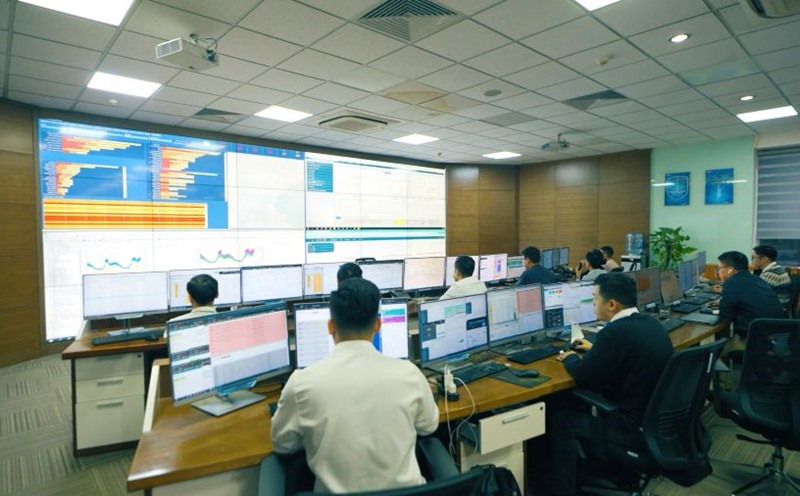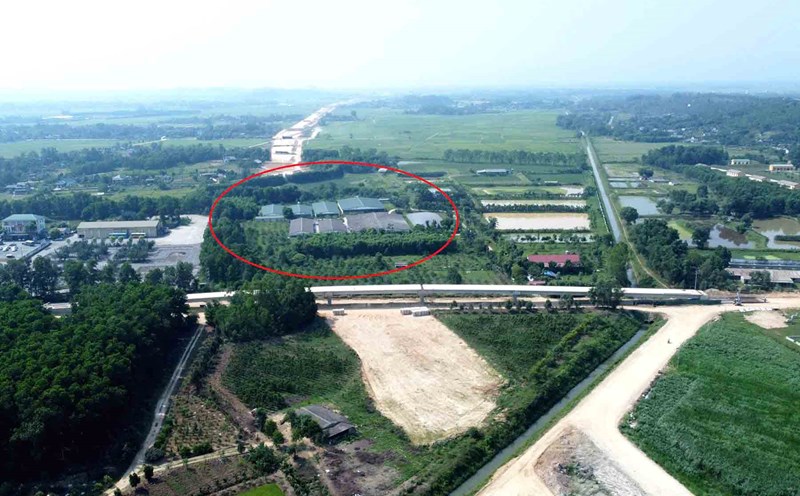- 15:50: Associate Professor, Dr. Nguyen Lan Huong, Former Director of the Institute of Labor Science and Social Affairs: Human resource development - a prerequisite for digital economy and green growth
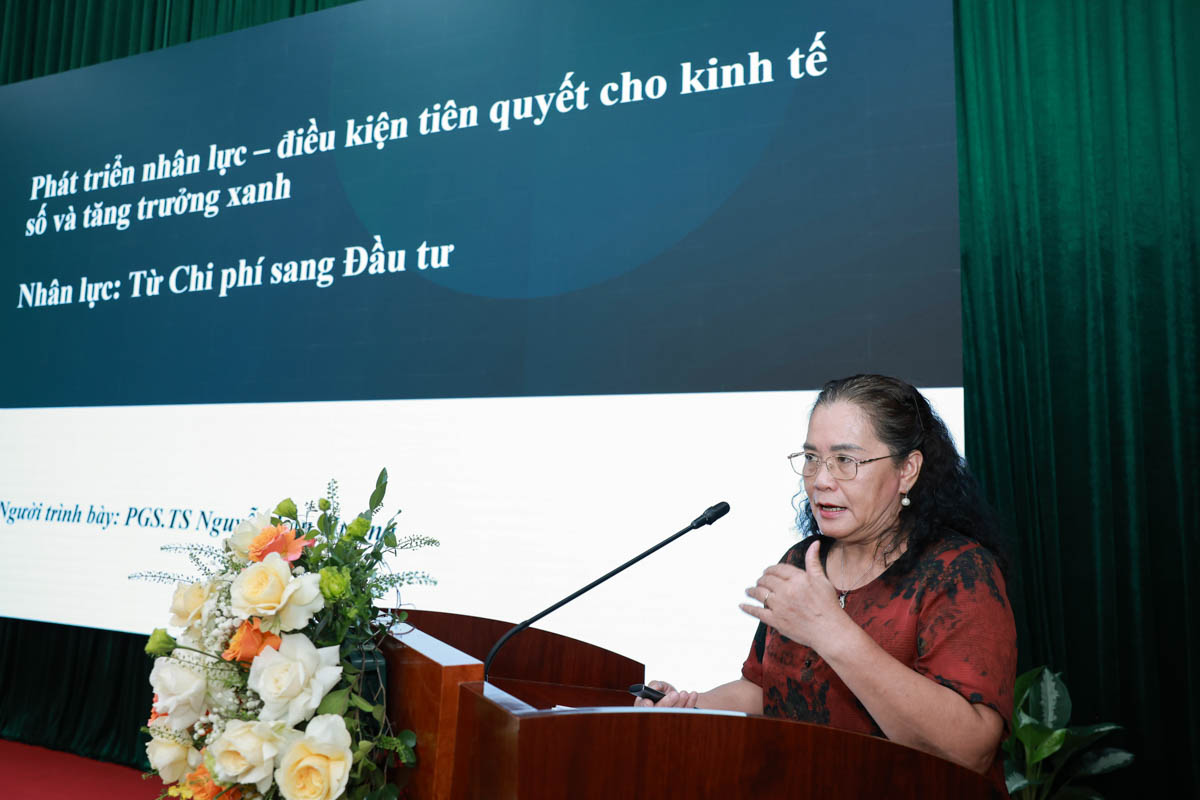
According to Associate Professor, Dr. Nguyen Lan Huong, human resources are not only the ones who carry out work but also the ones who propose ideas, apply technology, and create new values for businesses. A team of high-quality human resources helps businesses adapt quickly to the market, innovate products and overcome challenges. In a globalized environment, human resources are a sustainable competitive advantage over capital or technology. Planning, training and retaining talent is a long-term strategy to help businesses develop stably.
Human resources are human resources including intelligence, skills, and physical strength contributing to economic growth and social progress. Human resource development helps increase income, improve quality of life and boost productivity. Human resources are not only a skill but also carry spiritual value, national identity - an important factor in sustainable development. A society with quality human resources will create a positive impact on education, healthcare, technology and the environment.
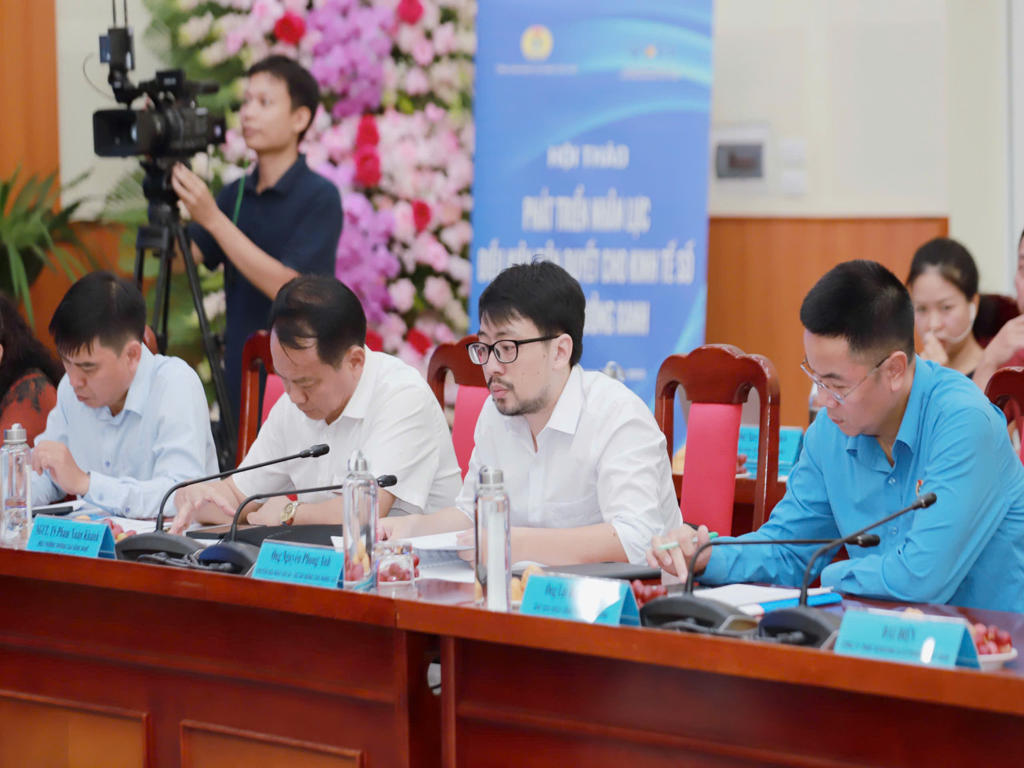
- 15:35: serious shortage of high-quality human resources
Ms. Vi Thi Hong Minh, Deputy Director of the Department of Employment Affairs - VCCI, said that in the context of the global situation entering the "dual transformation" stage - both digital transformation and greening the economy, human resources have become a key factor determining the competitiveness of each country and enterprise.
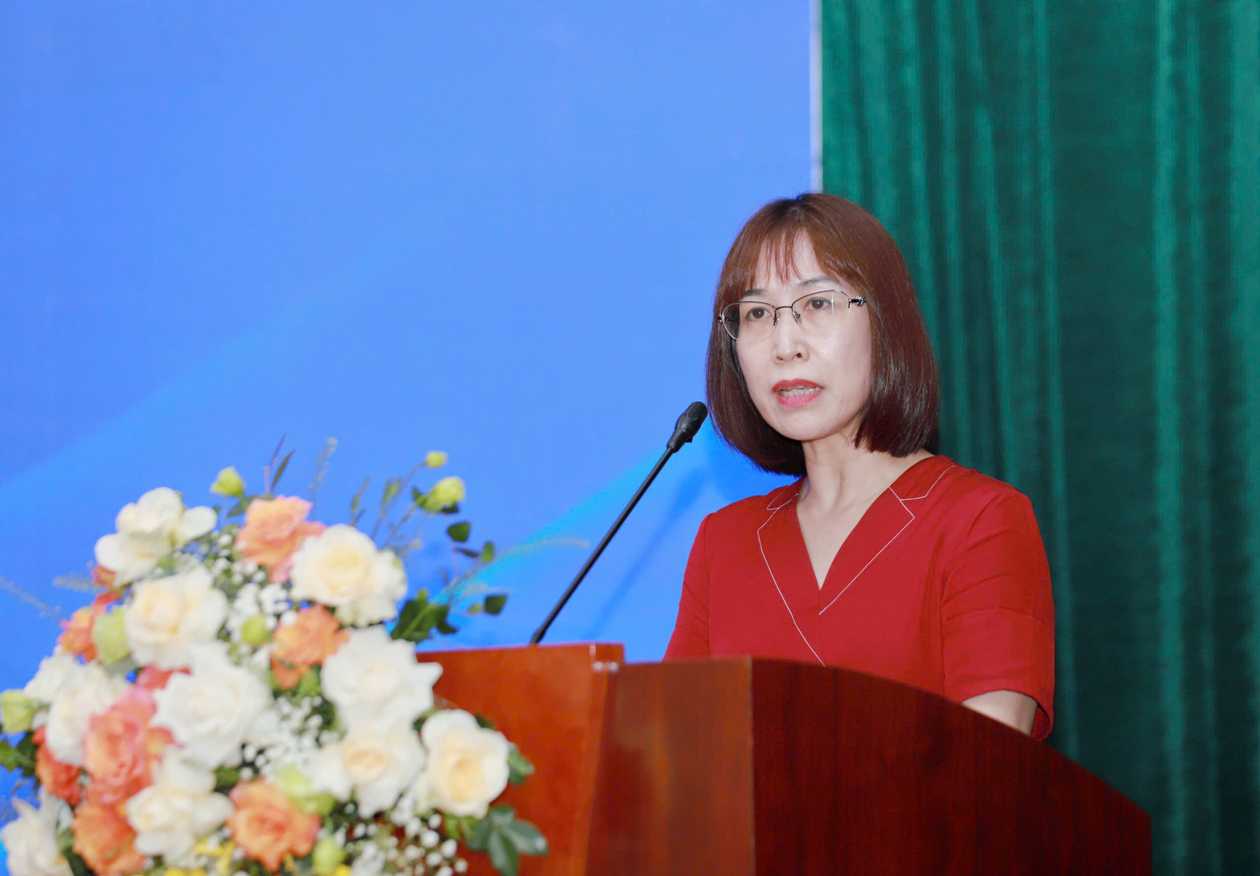
Vietnam aims to have a digital economy account for 30% of GDP by 2030 and aim for net zero emissions by 2050. To achieve this goal, not only requires investment in technology but more importantly, preparing and developing human resources to meet the requirements of "digitalization" and "greening" is a priority task in the present and the future.
According to the Labor Market Newsletter for the first quarter of 2025, the whole country has 51.9 million unemployed people out of a total of 52.9 million people participating in the labor force, the rate of trained workers with degrees and certificates accounts for 28.8%, lacking both quantity and technical expertise, especially high-quality human resources...
Ms. Vi Thi Hong Minh pointed out the challenges of human resources in digital - green transformation.
serious shortage of high-quality human resources: Vietnam's demand for information technology and digital industry human resources is about 150,000 engineers/year, but is currently only 40-50%. The human resource demand of the semiconductor industry alone is 5,000-10,000 engineers/year, but the capacity to meet the demand is less than 20%. By 2030, the whole country needs 2.5 million human resources to serve digital transformation. It is forecasted that by 2030, 2.5 million personnel will be needed to serve digital transformation, not to mention the human resource needs for renewable energy, circular economy and green production sectors.
Skills gap between training and actual needs: The rate of trained workers with degrees and certificates accounts for 28.8%, many of whom lack soft skills such as foreign languages, communication, problem solving and digital thinking...
Unemployment risk due to automation and new technology: Labor-intensive industries such as textiles, footwear, electronics assembly... employ millions of workers facing the risk of 70% of jobs being replaced by robots and AI in the next 10 years.
VCCI representative quoted the Ministry of Science and Technology as saying: The information technology and communications industry (ICT) in the world is one of the three industries with the fastest human resource reduction in the past 5 years at 23%. From the end of 2022 to now, about 380,000 workers have lost their jobs, accounting for 1.9% of global human resources.
Enterprises, especially SMEs, lack resources to implement "dual transformation": Many small and medium enterprises do not know where to start, lack data, solutions and specialized personnel to both transform digitally and meet green standards.
Ms. Vi Thi Hong Minh made some recommendations as follows:
For the State: Complete the legal framework and policies to encourage training of digital - green human resources; strongly invest in vocational education, STEM and industries serving the green economy; build a national database on skills supply and demand.
For businesses: Proactively build a long-term human resource strategy, combine internal training and cooperate with educational institutions; actively participate right from the design and development stage of training programs, especially in vocational education and on-site training programs. Invest in technology to support learning and skills assessment. Combine business goals with ESG standards and human resource strategies.
For training institutions: Update teaching programs associated with business practical requirements; expand international cooperation, continue to promote the implementation of combined training and internship models at enterprises; innovate training programs in an open, flexible direction, associated with practice and market demand. Increase the practice period, cooperate closely with businesses to organize according to the dual training model. Develop a team of high-quality lecturers, especially in the fields of technology, engineering, and innovation; increase the application of digital technology in teaching, build an online learning platform, and a digital university model. Promote the development of digital human resources through digital skills training, innovative thinking and the ability to adapt to new technology...
- 15:20: National human resource development strategy in the digital transformation and green growth era
At the workshop, Mr. Nguyen Khanh Long - Deputy Director of the Department of Employment (Ministry of Home Affairs) said that in the past 5 years, the world order has witnessed many changes when the trend of multilateralism and industrialization was tested by nationalism and protectionism. The conflict between Russia and Ukraine has not shown any signs of cooling down, while geopolitical hotspots such as the Taiwan Strait, East Sea, and the Middle East (Israel - Palestine, Iran - US) continue to escalate. These events have had a strong impact on the strategic calculations of businesses and countries, in which Vietnam as an alternative manufacturing center in the ASEAN region has also been strongly affected.

At the same time, tariff confrontations between the US - China, the US - EU, China - EU continue to increase, not only affecting trade in goods but also redirecting the supply chain, while setting new barriers to traceability, green labor, carbon traceability, etc.
For example, new EU regulations on the CBAM (Carbon Border Adjustment Mechanism) mechanism force businesses in the supply chain to be transparent on CO2 emissions throughout the entire product life cycle. EVFTAs, CPTPPs, and EU supply chain appraisal laws also strengthen standards on labor, safety, occupational hygiene, and environmental protection responsibility. Thus, not only the cost of logistics and materials has increased, but the risk of losing orders due to lack of transparency in traceability and human resources not meeting international requirements is also very high.
In a general report at the 113th International Labor Conference (June 2025), ILO Director General Gilbert F. Houngbo emphasized: Economic, geopolitical and protectionist fluctuations are posing many challenges to sustainable employment, especially in developing countries.
Vietnam needs to adapt quickly to these movements, not only to protect the supply chain, but also to take advantage of investment shift opportunities, creating stable jobs for the domestic workforce, said Mr. Long.
At the 113th International Labor Conference (June 2025), ILO Director General Gilbert F. Houngbo emphasized that: "Green transformation does not mean unemployment. On the contrary, this is a great opportunity to create new industries, green, sustainable and inclusive jobs".
According to the ILO - IRENA - UNEP Joint Report, if designed correctly, green transformation can create 25 million new jobs globally by 2030, while minimizing the risk of job loss due to the impact of temperature stress, natural disasters, supply chain restructuring...
Green growth also requires a new human resource structure: workers with green skills, understanding environmental regulations, efficiency in using resources and renewable energy. In many countries ( OECD) (Organisation for Economic Co-operation and Development), "green skills for the future" programs have been integrated into general education, employment services and vocational ecosystem planning.
In Vietnam, the National Green Growth Strategy was approved by the Prime Minister in Decision No. 1658/QD-TTg dated October 1, 2021, the renewable energy ecosystem, organic agriculture, and low-carbon logistics are opening a new career direction. However, recent reports from ADB and ILO show that Vietnam is facing a serious risk of shortage of green skills-trained workers, especially in small and medium-sized enterprises. This requires us to urgently invest in retraining and specialized training according to green transformation needs and inclusive employment policies.
Regarding the strategic importance of human resources, Mr. Nguyen Khanh Long said that in the context of the world changing strongly under the impact of digital transformation and commitments on green growth, human resources are identified as a key factor determining the adaptability and sustainable development of each country for the following reasons:
Regarding the pressure from digital transformation, according to Mr. Long, digital transformation is reshaping the entire labor market and the professional skills of workers. According to the International Labor Organization (ILO), more than 1 billion workers globally will be at risk of "re-working" if they are not supported with additional digital skills. Notably, many fields such as banking, logistics, automated manufacturing, healthcare, education, customer service have applied artificial intelligence (AI), robots and big data integration systems, leading to large-scale human resource reduction. In Vietnam, many industries such as finance - banking, logistics, healthcare, education, services... have been applying high technology, leading to new requirements for labor skills. If they are not retrained, a large number of workers will be left behind.
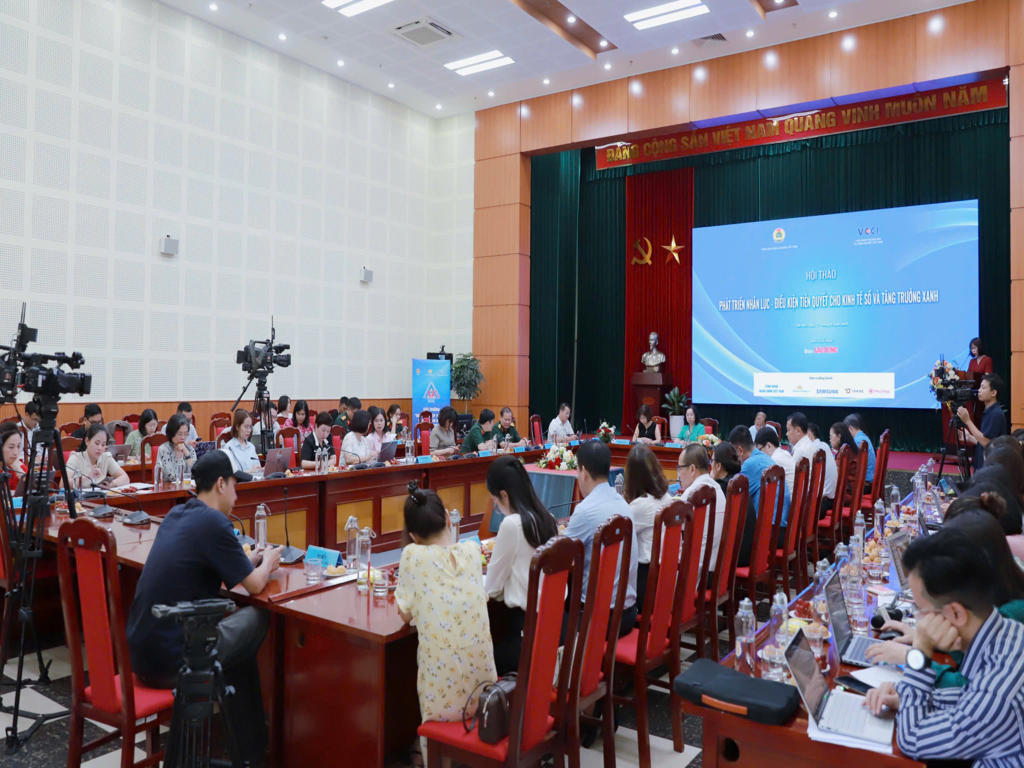
At the 113th International Labor Conference, ILO emphasized the risk of increasing inequality in digital transformation. Workers in the informal sector, elderly workers, women, and poor youth are facing the risk of being left on the sidelines during the automation process if they are not equipped with digital skills. A clear reality is the rate of penetration of digital labor (platform work) to every corner of the economy. Outstanding applications such as technology vehicles, delivery, cleaning, content design, online freelancer... However, the digital economy also poses many legal challenges when many workers are not protected in terms of contracts, insurance, minimum wage or negotiation rights.
Therefore, digital transformation needs to be recognized not only as the nature of the 4.0 Industrial Revolution, but also as a challenge to social security, with traditional contract models and with efforts to build a workforce with digital skills. In that context, the national strategy for human resource development must consider digital transformation as an axis connecting with vocational training, sustainable jobs and social security.
Regarding the commitment to green growth and new job trends, the representative of the Department of Employment said that in the context of climate change and international requirements for carbon neutrality, green conversion has become an inevitable path for all economies. This is not only an environmental commitment but has become a factor to maintain national and business competitiveness.
First, human resources are the driving force of sustainable growth: Traditional economic growth based on resource exploitation and cheap labor is gradually coming to term. Meanwhile, sustainable development models increasingly require the contribution of a highly qualified workforce capable of accessing new technology, innovating and complying with green development standards. According to the National Assembly Standing Committee's Supervisory Report No. 1385/BC-DGS dated August 6, 2025, by 2024, Vietnam will have about 38 million workers who have not been trained from primary school or higher; the rate of trained workers with degrees and certificates in Vietnam will only reach about 28.3%, much lower than the average of countries in the ASEAN region. This poses an urgent need to improve the quality of human resources.
Second, the center of digital transformation: Digital transformation is only successful when there is a synchronous transformation in the skills of the workforce.According to the World Economic Forum (WEF), up to 44% of current workers' skills will become outdated within the next 5 years if they are not retrained or upgraded.In Decision No. 749 dated June 3, 2020 on the National Digital Transformation Program to 2025, with a vision to 2030, digital human resource development was identified as one of the three important pillars in the National Digital Transformation Strategy to 2030.However, only about 35% of Vietnamese workers self-assess enough digital skills to meet future work requirements ( Microsoft and LinkedIn, 2024).This is a big gap that needs to be filled through the education system, vocational training and lifelong skills development policies.
Third, human resources are the foundation of green growth: Currently, green jobs account for about 3.6% of total employment, but more than 40% of jobs are likely to change if they are properly trained (World Bank, ILO).This is a large area to link employment policies with environmental goals.The trend of recruiting "Green human resources" - the core of green jobs, contributing to green growth is increasing in the world...The International Labor Organization (ILO) estimates that by 2030, the global sustainable energy transition can create 25 million jobs, the Asia-Pacific region alone can create 14.2 million green jobs if these countries invest heavily in environmental issues.
In Vietnam, although it is only in the early stages of green transformation and green economy, experts say that the green employment trend is being noticed by many businesses in recruitment. The report "Searching for meaning at work" by the world's leading human resources solution provider Manpower Group in 2024 said that up to 85% of Vietnamese workers are interested in the reputation of a company for social responsibility when deciding to take a job. Data from the World Bank shows that Vietnam currently has 39 green industries, accounting for 3.6% of total employment. In the near future, up to 88 occupations are predicted to have the potential to become green jobs, accounting for 41% of the total number of jobs in the market.
Fourth, national competitive advantage: In the post-resurce era and knowledge economy, human resources have become the most important endogenous factor driving growth.Without quality human resources, all policies, all technologies and all capital sources cannot be fully effective.In particular, in the context of increasingly fierce global competition, any country that owns a workforce capable of innovation, mastery of technology and rapid adaptation will have the advantage.Vietnam, with a young population and a high rate of working-age people, has great potential if there is a systematic and breakthrough human resource development strategy.
The National Green Growth Strategy for the period 2021-2030, with a vision to 2050 (Decision No. 1658/QD-TTg dated October 1, 2021) and the National Action Plan (Decision No. 882/QD-TTg dated July 22, 2022) both identify human resource development as one of the key task groups.In particular, emphasizing the development of green skills, raising awareness and state management capacity of green growth at all levels.The implementation of these contents requires inter-sectoral, inter-level coordination and synchronous investment from the central to local levels.
In order to ensure both the quantity and quality of national human resources in the digital transformation and green growth era, Mr. Nguyen Khanh Long said that it is necessary to synchronously deploy a number of the following strategic solutions:
It is necessary to issue a National Strategy on human resource development associated with digital transformation and green growth, in which it is necessary to clearly define the goals, vision and unified orientation from the central to local levels on human resource development to meet the two main trends of digital transformation and green growth.
Incorporate human resource development goals and solutions into the National Master Plan, Green Growth Strategy, and Employment Policy Plan, clearly identify priority industries by 2030, such as: information technology, artificial intelligence, renewable energy, high-tech agriculture, low-carbon logistics, smart manufacturing, sustainable tourism.
Classify skills needs according to industry groups, includinghard skills and soft skills such as: digital thinking, data management, green technology management skills, environmental risk management.
Promote retraining and upgrading skills for the workforce, focusing on digital skills, from basic IT skills, data mining, AI use, to automation system operations and green skills: understanding environmental standards, clean production processes, energy efficiency, waste management.
To effectively implement this content, it is necessary to establish a national training program on digital - green skills with a specific roadmap for each industry; promote tripartite cooperation between the State - Enterprises - Training institutions to ensure the program is close to practical needs; encourage businesses to participate in on-the- job training and grant nationwide recognized skills certificates.
For workers, especially vulnerable groups, there should be financial support policies and other policies so that workers can participate in retraining without interruption in income.
Build and operate a national database on digital human resources and green human resources, applying Big Data, AI technology, and forecast analysis tools to ensure accuracy and updating with the goal of collecting, updating, and analyzing data on the quantity, quality, distribution, and skills of the workforce; forecasting career fluctuations, new job trends, and the risk of job loss due to the impact of technology or environmental requirements.
The results of effective database operation will help the Government plan human resource development policies close to reality and in a timely manner; provide information for businesses in recruitment and long-term human resource planning; support individuals in career orientation and appropriate training options.
Develop a specific local human resource strategy according to the principle that each locality is based on comparative advantages, natural - economic - social conditions and development planning to build its own human resource strategy.
For example: Rural areas, plains: developing human resources for high-tech agriculture, agricultural processing, circular economy.
Coastal areas: training green marine economic human resources, sustainable aquaculture, offshore wind energy.
Urban and industrial areas: focus human resources on smart manufacturing, digital technology, low-carbon logistics.
Tourism sector: developing human resources for eco-tourism, community tourism, and environmental conservation.
- 15:10: Ms. Phan Thu Thuy - Deputy Editor-in-Chief of Lao Dong Newspaper delivered the opening speech at the workshop
According to Ms. Thuy, the global economy is entering a period of profound transformation. All countries are promoting dual transformation - both digital transformation to improve productivity, efficiency, and green growth for sustainable development and adaptation to climate change. Vietnam is also actively integrating into that trend, considering this an inevitable path to improve competitiveness and comprehensively develop the socio-economy.

This process requires a shift from breadth to depth growth, from resource exploitation to value creation, from linear consumption to a circular economy. Regardless of the perspective, people and human resources are always the center - deciding the speed and quality of all transformations.
These orientations have been clearly affirmed in Resolution No. 57-NQ/TW dated December 22, 2024 of the Politburo on breakthroughs in the development of science, technology, innovation and national digital transformation, and Resolution No. 68-NQ/TW dated May 4, 2025 of the Politburo on private economic development.
As a press agency of the Vietnam General Confederation of Labor, Lao Dong Newspaper always identifies its mission as the voice of workers, for workers. Not only reflecting and informing in a timely manner, we also proactively create forums to connect the State - Enterprises - Workers, inspire initiatives, introduce effective models, spread inspirational stories, and honestly reflect difficulties and shortcomings from practice. Therefore, today, under the direction of the General Confederation, in coordination with the Vietnam Federation of Commerce and Industry, Lao Dong Newspaper organized the Workshop "Developing human resources - prerequisites for digital economy and green growth". The workshop is an opportunity for policy makers, employers, trade unions, businesses and experts to discuss, share experiences, and propose feasible solutions to narrow the gap between policies and actions.
We hope that the results of today's workshop will not stop at the disciplined pages, but will continue to be widely monitored, reflected and disseminated by Lao Dong Newspaper, contributing to promoting the development of human resources - the foundation of a digital economy, green and sustainable economy" - Ms. Phan Thu Thuy said.
- 15:00: Ms. Thai Thu Xuong - Permanent Vice President of the Vietnam General Confederation of Labor; Mr. Hoang Quang Phong - Vice President of VCCI; Ms. Phan Thu Thuy - Deputy Editor-in-Chief of Lao Dong Newspaper - chaired the workshop.
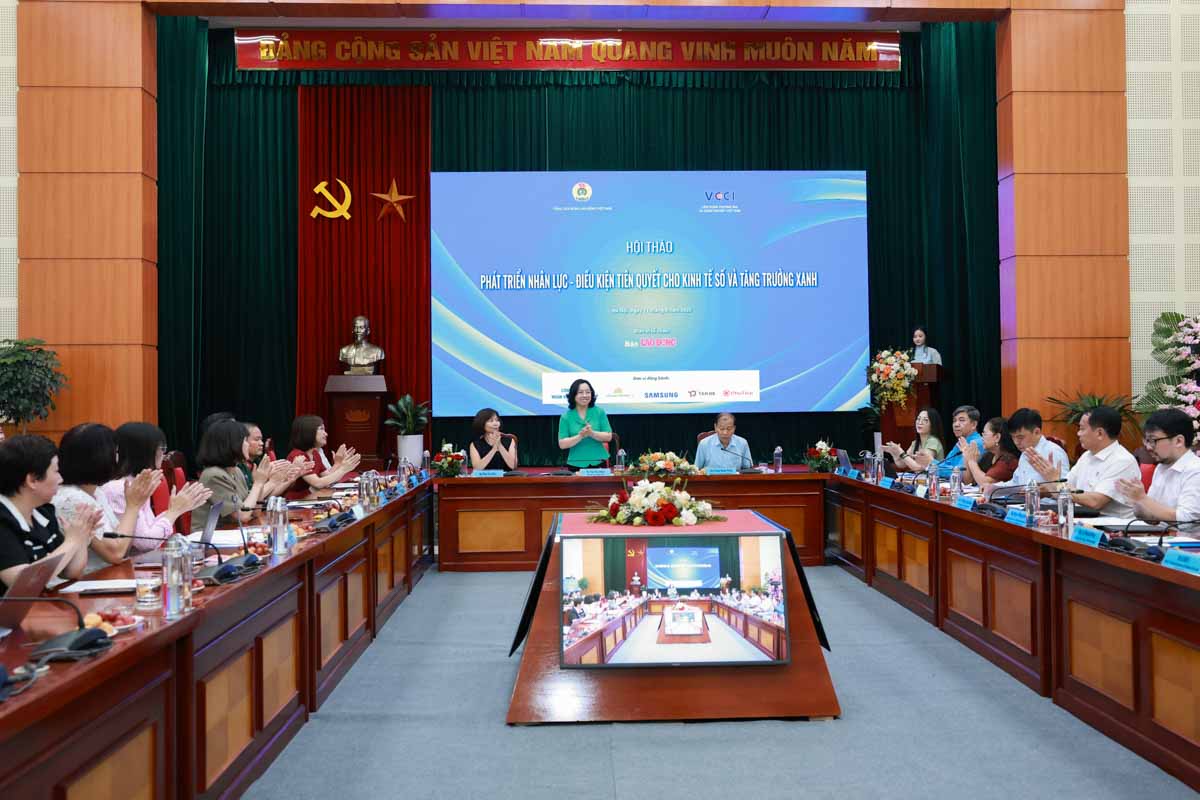
On the afternoon of August 11, the Vietnam General Confederation of Labor in coordination with the Vietnam Chamber of Commerce and Industry (VCCI) and Lao Dong Newspaper organized a workshop with the theme: "Human resource development - a prerequisite for digital economy and green growth".
The workshop was held at the headquarters of Lao Dong Newspaper (No. 6 Pham Van Bach, Cau Giay Ward).
It is expected that leaders of the Vietnam General Confederation of Labor, leaders of the Vietnam Federation of Commerce and Industry (VCCI), and Lao Dong Newspaper will chair the workshop.
The program is expected to include 2 presentations and 1 round-robin discussion session, with the participation of experts on human resources, digital transformation, green growth; representatives of some typical enterprises investing heavily in workers; representatives of industry unions, localities, grassroots unions; representatives of vocational training institutions, universities; social organizations, business associations.
The workshop is an opportunity for leaders of central agencies, business representatives, experts, trade unions and the media to jointly identify trends, share experiences, analyze challenges and propose solutions to develop human resources in accordance with new requirements of the economy.
Thereby, affirming the role of workers not only as implementers, but as a force that creates value and motivates sustainable development in the future.
In the context of the global economy shifting strongly towards the digital economy, green economy and sustainable development, the requirement for human resource quality is becoming increasingly urgent. Vietnam is no exception to that trend. Converting the growth model from breadth to depth requires putting people - especially workers - at the center of the development process. Human resource development is not only a social policy, but has become a prerequisite to improve national competitiveness and ensure the adaptability of businesses in the new era.
Ms. Nguyen Thanh Huong - Head of Human Resources for the whole country, Manpower Vietnam Company said that in order to develop human resources in line with the context of the digital economy and green growth, there needs to be close coordination between entities: state - enterprise - trade union organization - training institution. In particular, enterprises play a proactive role in investing and employing labor; trade unions accompany in protecting and improving the capacity of workers; the state creates a legal framework, incentive mechanisms and orientations for national human resource development.
In the context of businesses promoting digital transformation to improve efficiency and competitiveness, the decisive factor for success lies not in technology, but in the team of suitable and ready-to- adapt human resources. However, the biggest weakness of the Vietnamese workforce at present is the limited professional qualifications and skills, which have not met the requirements of the digital economy.
The rate of skilled workers is generally low: According to the ManpowerGroup's Total Human Resources Index report, Vietnam currently has about 11% of workers with high skills. This is considered a fairly low level in the region compared to countries such as Malaysia (29%), the Philippines (18%) or Thailand (14%).
The quality of labor is not uniform: Although Vietnam owns a young workforce (generation Y, Z, Alpha workers account for 65%), the professional qualifications and digital skills of many workers are still limited, especially in rural areas and remote areas. The difference in economic and educational development levels between regions has created a significant gap in labor quality and access to technology...


